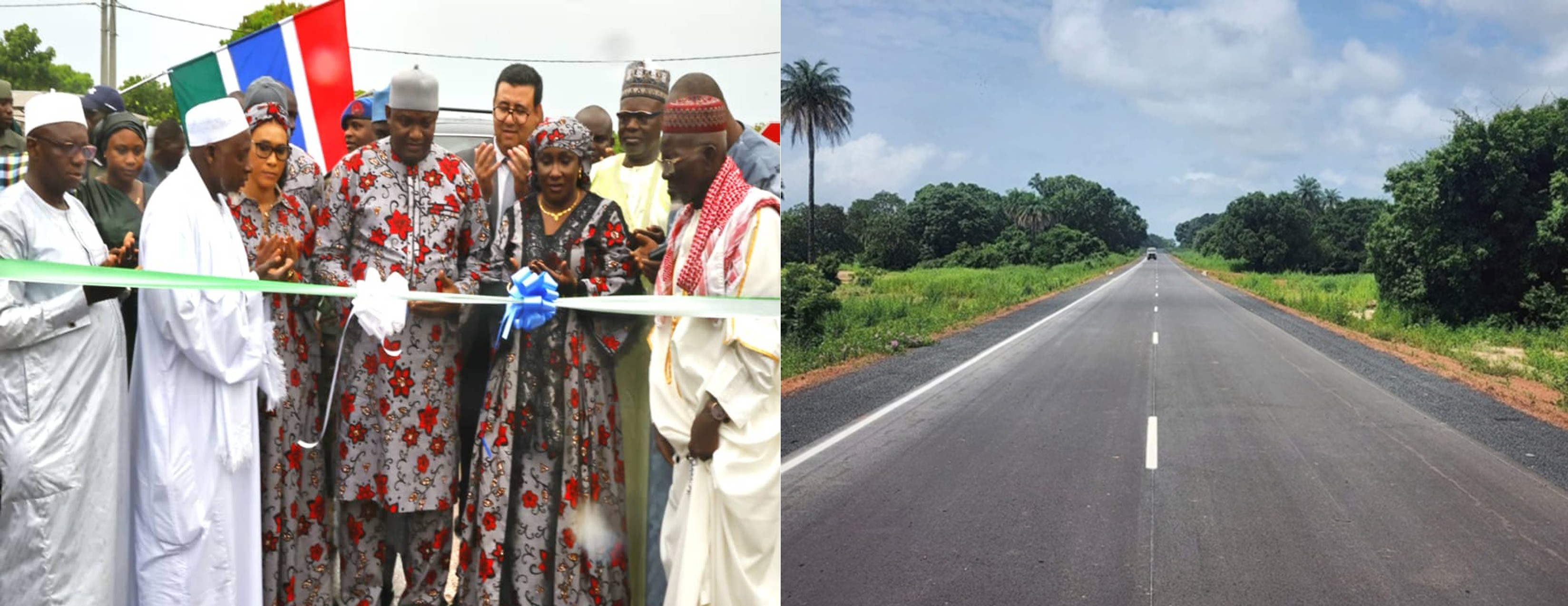Copyright thepoint

In a landmark moment for North Bank Region (NBR), President Adama Barrow has officially inaugurated the long-awaited 85-kilometre Hakalang Road, fulfilling a promise he made to the people of Upper, Lower Nuimi and Jokadou during his 2016 presidential campaign. In just under nine years into his administration, that promise has been fulfilled, eliminating decades of persistent challenges that communities in the area have faced since the nation's independence. The ribbon-cutting ceremony, held over the weekend, marked the end of decades of isolation for over 100 communities in the region. For many residents, the idea of a well-paved road, let alone a basalt-surfaced one, had long seemed unimaginable. Since independence, the area had endured treacherous road conditions that hindered mobility, economic growth, and access to essential services. Hundreds of local residents thronged the roadside, waving enthusiastically at the President in a jubilant mood - signaling that their decades-long struggle in the dust was finally over. For many, it was a dream come true, especially for those who thought they would never live to witness such a transformative development. In the historic village of Jufureh, thousands of supporters of the government and the ruling party gathered not only to witness a landmark occasion, but also to hear from various speakers, including the President himself. He assured the crowd of his administration’s continued commitment to addressing their needs and improving their lives. The President personally drove from Buniadou to Nuimi Bakindiki, witnessing firsthand the smoothness of the road, a road once dismissed by critics who claimed it would never be built when the foundation stones were laid years ago. Today's, it stands completed and inaugurated, fully funded by the government through taxpayers' contributions. The 85-kilometer stretch, which passes through numerous villages, is being hailed as a game-changer for mobility, trade, and development in the region. For pregnant women and mothers, the journey to health facilities was often perilous, with many forced to travel long distances on foot or by donkey cart through treacherous terrain. Farmers faced immense challenges transporting their produce to markets, stifling economic growth and deepening rural poverty. The newly completed road links Upper Nuimi, Lower Nuimi, and Jokadou, opening up access to vital services and economic opportunities. With the majority of these communities now also connected to the national electricity grid, the synergy between power and mobility is expected to catalyze local enterprise, improve agricultural productivity, and enhance the delivery of social services. The Hakalang Road is one of the flagship infrastructure projects under President Barrow’s administration, which is now in its ninth year. It reflects his broader vision of national unity and equitable development, ensuring that no region is left behind. Local testimonies revealed that the road is not merely asphalt and stone, it is a lifeline. Many expressed that they never imagined they would see such a road in their lifetime. While critics had previously dismissed the foundation stone laid years ago as mere political theatre, and others questioned the use of taxpayer funds, the sentiment on the ground tells a different story. Beneficiaries of the project have voiced their gratitude, pointing out that successive governments under Sir Dawda Jawara and Yahya Jammeh failed to deliver such infrastructure, despite continued tax contributions from the region. The Hakalang Road is more than a political milestone; it is a symbol of progress and inclusion. As vehicles now glide over smooth, where once there were potholes and mud, the people of Nuimi and Jokadou are stepping into a new era, one paved with opportunity, dignity, and hope. Speaking at a ceremony held at Jufureh, President Barrow, said: “This grand achievement adds to the shining examples of my government’s unwavering commitment to developing and transforming our national infrastructure for inclusive growth and improved quality life styles for every Gambian.” For decades on end, he said, the residents of the North Bank Region (NBR), particularly those in Upper Nuimi and nearby districts, had to endure the brutal hardship of isolation and limited access to important social services due to bad roads. “Such immense challenges forced our farmers to struggle extremely hard to transport their produce, while traders had to face huge obstacles before reaching the business centres of their choice. Access to schools, markets, healthcare facilities, and other services remained a nightmare.” Barrow added: “Considering the critical size of the Gambian population in this region, my government deemed it morally and economically necessary to fund this entire road project. Originally contracted to cover eighty-four kilometres, seven hundred metres (84.7 km), the road links more than thirty (30) communities in various parts of the Nuimi and Jokadou districts.” “In view of its importance, this infrastructure is symbolically more than a road. It signifies progress, unity, and inclusive development, brought about by a government of the people and for the people. Clearly, it equally demonstrates our resolve to develop every corner of the country.” “To you, the residents of Hakalang, I convey our deepest appreciation. Your cooperation, resilience, and patience over the years have not gone in vain. You waited, hoped, and remained committed to the greater good that lay ahead.” “This road is, therefore, not just for you; it is also because of you that it is here. We deeply appreciate the remarkable strength, unity, and patriotism you displayed in the face of long operational delays and difficult conditions. No wonder you have happily converged here as proud beneficiaries of a remarkable project that you have long deserved.” “Let us now work together to preserve and maintain this national asset. Cherish it as a mark of honour and an indication of what The Gambia government and citizens can achieve when we unite and act together.” Sulayman Sumareh Janneh, the acting managing director of the National Roads Authority (NRA), said: “The Nuimi Hakalang is a road that connects hearts and futures and it is stretching across the proud communities of Buniadu, Sitanunku, Bafuloto, Memeh, Juffureh, Albreda, Chila, Fass Omar Saho, Bangally, and beyond. This road breathes life into the dreams of thousands. This Engineering Excellence with a Vision for Sustainability Built to modern international engineering standards is a triumph of technical precision and environmental consciousness.” Key design features on the road, he said, include: A bituminous surface dressing engineered to withstand The Gambia’s climatic variations, ensuring a smooth and durable all-weather surface, a 10-meter carriageway width, inclusive of shoulders, prioritizing both vehicular efficiency and pedestrian safety, reinforced hydraulic structures, culverts, and side drains, meticulously designed for optimal stormwater management and erosion control, comprehensive earthworks and compaction layers executed with exacting precision to guarantee strength and stability, and environmental safeguards embedded at every phase to preserve the ecological integrity of our natural surroundings. He added: “This project is not only a road, but one chapter in a broader national agenda. The Ministry of Transport, Works and Infrastructure, together with the National Roads Authority, continue to envision a fully connected Gambia, one where every region is linked, every community empowered, and every citizen afforded the opportunity to thrive.” “Feasibility studies are already underway to expand similar infrastructure links across the North Bank Region and beyond, strengthening the arteries of trade, mobility and regional integration.” Local accounts Speaking on behalf of the Alkalolu of the area, Modou Ida Bah expressed heartfelt gratitude for the road, describing it as a long-overdue lifeline for the region, saying: "We have waited for this moment for years." “This is something we have been yearning for years. These roads have disturbed us so much. For decades, we kept asking ourselves when this road will be built. Today, we are no longer asking, we are celebrating,” he said. Bah recounted a conversation with a prominent opposition leader who admitted that during their tour of the area, three of their vehicles broke down due to the poor road conditions. “Even the opposition recognized the hardship. Now, we must repay the president for this development. We have never dreamed of a basalt road, but now we have that, plus electricity and good schools.” Omar Drammeh, a youth representative, underscored the historical significance of the road, noting that previous presidents Jawara and Jammeh had tried and failed to construct it. “Before, when traveling to Banjul, we had to stop in Barra just to wash off the dust. Today, thanks to President Barrow, we have electricity, schools, and good roads,” he said. Drammeh assured the president of overwhelming support in the 2026 elections, claiming that youths in the North Bank Region will rally behind him. He also thanked the government for providing affordable fertilizer to farmers and urged further road development in Jokadou. Women’s representative Fatou Camara echoed similar sentiment, emphasizing that good roads are essential for development. “We, the women and youth, are behind the government. We will show our appreciation by voting massively for the president,” she said. “We thank him for supporting agriculture and urge our communities to embrace the development agenda and reject anything that could bring chaos.” Momodou Chatty Cham, speaking on behalf of the District Chiefs, thanked President Barrow for alleviating years of suffering caused by poor infrastructure. “The Alkalolu and chiefs are united in support. We will ensure our people rally behind the government,” he said. Cham challenged opposition claims that the road was built solely from tax revenue, asking why previous governments failed to construct it despite collecting taxes. NPP regional chairman, Ahmad Sarr, commended the president’s commitment to nation-building, adding: “This road is proof of rapid development. We stand firmly behind the president as he continues to transform our country.” Honoring History and Sacrifice Omar Darboe, National Assembly Member for Upper Nuimi, highlighted the symbolic importance of the road, noting that sections have been named after historical figures like Landing Jallow Sonko and Kunta Kinteh. “When the foundation stone was laid, critics called it propaganda. Today, we are witnessing its inauguration. Despite having no natural resources, this government made it happen through taxes,” he said. Darboe urged continued support for connecting inner communities with additional road projects. Economic Growth and a Call to Action Regional Governor Lamin Saidykhan emphasized the economic benefits of the road, saying: “This road will boost trade and accelerate growth. Both Jawara and Jammeh tried to build it but couldn’t. In just a few years, Barrow delivered,” he said. He called on youths to register and vote in the upcoming 2026 presidential election, reinforcing the message of gratitude and civic responsibility.



